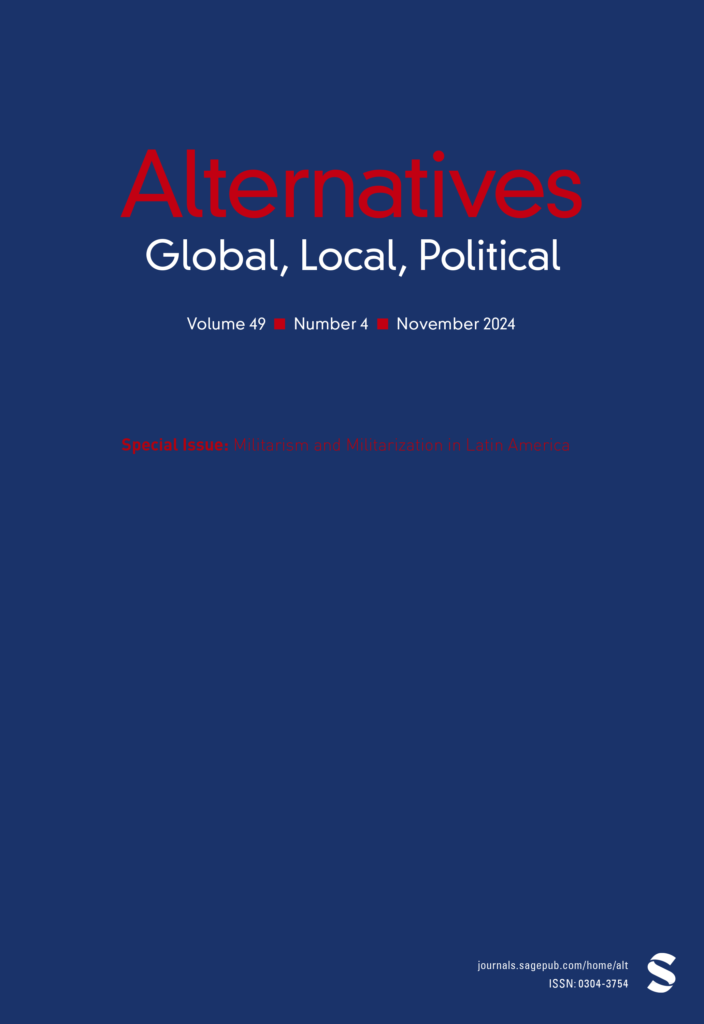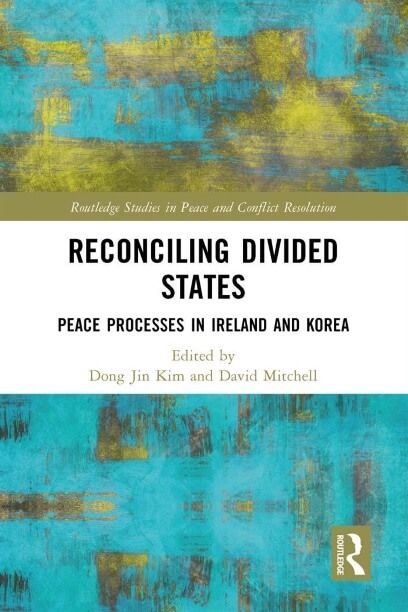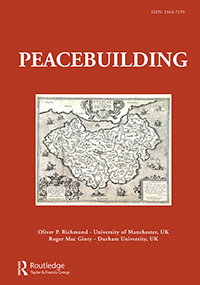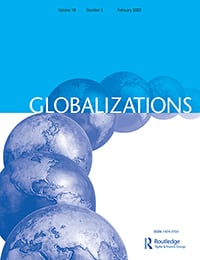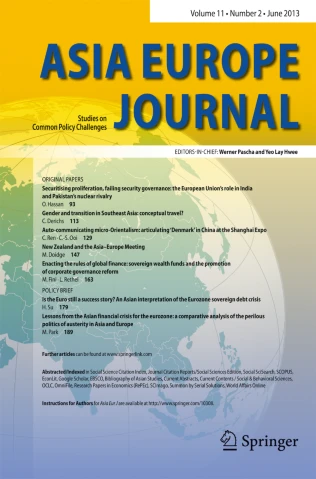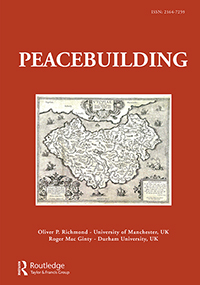
Journal Article, 2024
This article proposes a trans-local turn in peacebuilding in frontier societies. Drawing on René Girard’s concept of ‘mimetic desire’, the article conceptualises how a crisis of ontological insecurity cannot be addressed by rational approaches to institutionalising a process to resolve incompatibilities between conflict parties, but requires de-escalation of the mimetic rivalry between the parties, who are often described as being in conflict over identity. Empirically, the article focuses on the, apparently very different, examples of intractable conflicts in Northern Ireland and Korea, and the trans-local peacebuilding interactions between the two. This article demonstrates how relationships of unresolved mimetic rivalry have intensified ontological insecurity in both cases, creating dynamics of existential anxiety and mutual antagonism, and how the reflexivity based on peacebuilding stories from other frontier societies, which do not impose direct ontological threats, appears to increase hope for change by transcending the endemic sense of ontological insecurity.
Journal Article, 2023
One of the capacities of civil society in peace processes is the promotion of peace-oriented attitudes among citizens through peace education. This article investigates how civil society peace education may be enhanced through collaboration with counterparts in another conflict arena. The article begins by discussing the potential and pitfalls of the comparison of peace/conflict contexts. The empirical findings are based on interviews and focus groups with peace educators in Northern Ireland and South Korea who have engaged in dialogue and partnerships with each other, and they indicate perceived benefits and impact of both the comparative learning to the personnel and the partnership to the organisations. The discussion sets out an ideal model of the peace educative impacts of comparative learning and encounter. Overall, the findings show how local-to-local engagements between peace processes can support the civil society contribution to peacebuilding.
Book, 2022
Peace Processes in Ireland and Korea
This book offers a distinctive perspective on peace processes by comparatively analysing two cases which have rarely been studied in tandem, Ireland and Korea.
The volume examines and compares Ireland and Korea as two peace/conflict areas. Despite their differences, both places are marked by a number of overlaid states of division: a political border in a geographical unit (an island and a peninsula); an antagonistic relationship within the population of those territories; an international relationship recovering from past asymmetry and colonialism; and divisions within the main groupings over how to address these relationships. Written by academics and practitioners from Europe and East Asia, and guided by the concepts of peacebuilding and reconciliation, the chapters assess peace efforts at all levels, from the elite to grassroot organisations. Topics discussed include: historical parallels; modern debates over the legacy of the past; contemporary constitutional and security issues; civil society peacebuilding in relation to faith, sport, and women’s activism; and the role of economic assistance. The book brings Ireland and Korea into a rich dialogue which highlights the successes and shortcomings of both peace processes
This book will be of interest to students of Peace and Conflict Studies, Irish Politics, Korean Politics, and International Relations.
Journal Article, 2022
This article contributes to the growing body of scholarship on sport’s peacebuilding capacity by comparing the role of sport in two peace processes, Northern Ireland and Korea. Uniquely, the analysis is guided by the concept of strategic peacebuilding which goes beyond the much-criticised liberal peacebuilding ‘toolkit’ and emphasises the importance of coordinated action at all levels and by many types of actor. The empirical sections examine the peacebuilding roles of sport at state level – in relation to elite sport, symbolism and diplomacy – and at grassroots level, particularly people-to-people projects. The article shows how and why sport has been able to play certain peacebuilding roles in each case, as well as the constraints on sport placed by structural characteristics of the peace processes. The article argues that the sporting domain can make interdependent peacebuilding inputs at each peacebuilding level, and thus has a distinct potential as a dimension of strategic peacebuilding.
Journal Article, 2022
This article explores lesson sharing between local civil society peacebuilders in the Korean and Northern Ireland peace processes. It presents reciprocal empowerment, a concept primarily utilized in women’s empowerment literature, as a useful conceptual framework to be developed for examining interactions between local civil society peacebuilders who have mutual self-interest to overcome obstacles in top-down peace processes. Recently, historical similarities and concurrences in the peace processes have been increasing the lesson sharing visits between Korean and Northern Irish peacebuilders. Based on the in-depth empirical research on these visits, this article argues that comparative consultations between peace processes would not only generate useful lessons for each context, but also empower local peacebuilders, civil society in particular, provided the comparisons and interactions are reciprocal, not unidirectional or hierarchical. In this sense, this article contributes to the conceptual and practical discussions of every day, emancipatory peacebuilding.
Journal Article, 2020
This article explores the challenges and contributions of women in building and sustaining peace in protracted conflicts by conducting a comparative case study on Northern Ireland and Korea. Similarities in the histories of the conflicts and the concurrences in the peace processes have been attracting policy makers and researchers to share lessons between the Northern Ireland and Korean peace processes. However, the peacebuilding role of women and their transversal perspective have not yet received significant attention compared to the high-level agreements, signed predominantly by male politicians. This article identifies the similarities in the peacebuilding activities of women in Northern Ireland and Korea, in terms of their recognition of the interconnection between identity politics and patriarchy, building relationships across the divide through transversal dialogue, and initiating nonviolent peace movements against the militarism of their societies. The comparative case study also shows dissimilarities between the two cases, with regard to the freedom of women to move beyond boundaries, and being part of the official peace process. This article concludes the role of women in both contexts is a key element in sustainable peacebuilding; however, it appears that women’s peacebuilding would not be able to reach its full potential to break down violent structures in conflict-affected societies, as long as their transversal perspective remains at the level of social movement, not part of peacebuilding at all levels of societies, including high-level negotiations.
journal Article, 2018
A Comparative Case Study on the Northern Ireland and Korean Peace Processes
In both Northern Ireland and Korea, the euphoria following significant breakthroughs towards peace in the late 1990s and early 2000s turned into deep frustration when confronted by continuous stalemates in implementing the agreements. I explore the two peace processes by examining and comparing the breakthroughs and breakdowns of both, in order to identify potential lessons that can be shared for a sustainable peace process. Using a comparative case study, I demonstrate the parallels in historical analyses of why the agreements in the late 1990s and early 2000s in Northern Ireland and Korea were expected to be more durable than those of the 1970s. I also examine the differences between the two peace processes in the course of addressing major challenges for sustaining the two processes: disarmament; relationships between hard-line parties; cross-community initiatives. These parallels and differences inform which lessons can be shared between Northern Ireland and Korea to increase the durability of the peace processes. The comparative case study finds that the commitment of high-level leadership in both conflict parties to keeping negotiation channels open for dialogue and to allowing space for civic engagement is crucial in a sustainable peace process, and that sharing lessons between the two peace processes can be beneficial in finding opportunities to overcome challenges and also for each process to be reminded of lessons from its own past experience.

